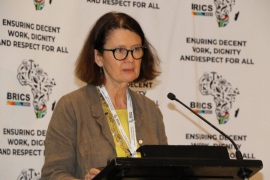
The International Labour Organisation (ILO) says skills development and lifelong learning in the informal economy should be rolled out to promote decent work.
“Closing the skills gap in the informal economy is essential for reducing work deficits and strengthening the ability of individuals and enterprises to move into the formal economy,” said Senior Advisor to ILO Assistant Director-General, Claire Harasty.
Harasty was speaking at the Brazil, Russia, India, China and South Africa (BRICS) countries' Employment Working Group (EWG) meeting on Tuesday.
The Department of Employment and Labour is hosting the second in a series of BRICS EWG meetings of the labour and employment stream.
Held in Port Alfred in the Eastern Cape, the meeting is taking place from 9 - 12 May under the theme, 'Ensuring decent work, dignity and respect for all'.
Addressing delegates, Harasty said the likelihood of being in informal employment decreases with high levels of educational achievement.
According to Harasty, in 2019, there were 900 million workers in informal work in BRICS countries, which is 45% of the two billion workers in informal jobs worldwide.
In BRICS countries, she said, there were more than nine in 10 people with no education work in the informal economy.
“In contrast, only one in four people with tertiary education end up in informal employment. Overall, around 62% of workers are in informal employment in BRICS countries.
“Informal employment ranges from 21% in the Russian Federation to around 40% in Brazil and South Africa, just above 50% in China and nearly 90% in India.”
Harasty said formalisation is a means to achieve greater access to decent work, reduce poverty, increase equality and productivity, and advance social justice.
She said skills and lifelong learning play an important role in creating incentives for individuals and enterprises to transition formality by increasing capacity and productivity, and also by “reducing the vulnerability and addressing decent work deficits”.
“Turning to skills acquisition in the informal economy likely occurs through informal on-the-job training. This training can be unstructured and occur through the form of a worker learning by doing or through informal learning from friends, family or community members.”
Harasty said the way forward includes recognition of prior learning, which allows government and other stakeholders to support informal economy workers in providing the skills that they have developed through apprenticeships, on the job training and non-formal learning.
“Closing the skills gap in the informal economy and strengthening the employability of individuals and ability of enterprises to enter into the formal economy is a means to archive decent work.”
Harasty said integrated policy solutions are needed to achieve transition, and this includes achieving horizontal alignment with other policy areas to reduce skills mismatch and to remove other bearers to the skills.
“Skills development strategies, policies and funding should give consideration to the needs of the informal economy.”
The first BRICS EWG and Research Network Forum meetings were held from 21 - 24 February 2023 in Muldersdrift, Gauteng.
The EWG meetings, which bring together officials and technical experts, will culminate in a BRICS Labour and Employment Ministers' Meeting to be held in September 2023, where a Ministerial Declaration will be adopted. – SAnews.gov.za


